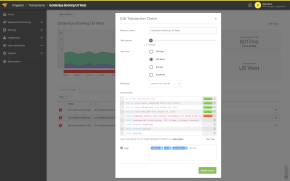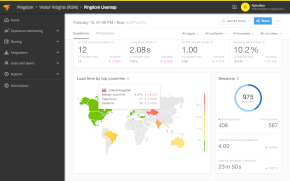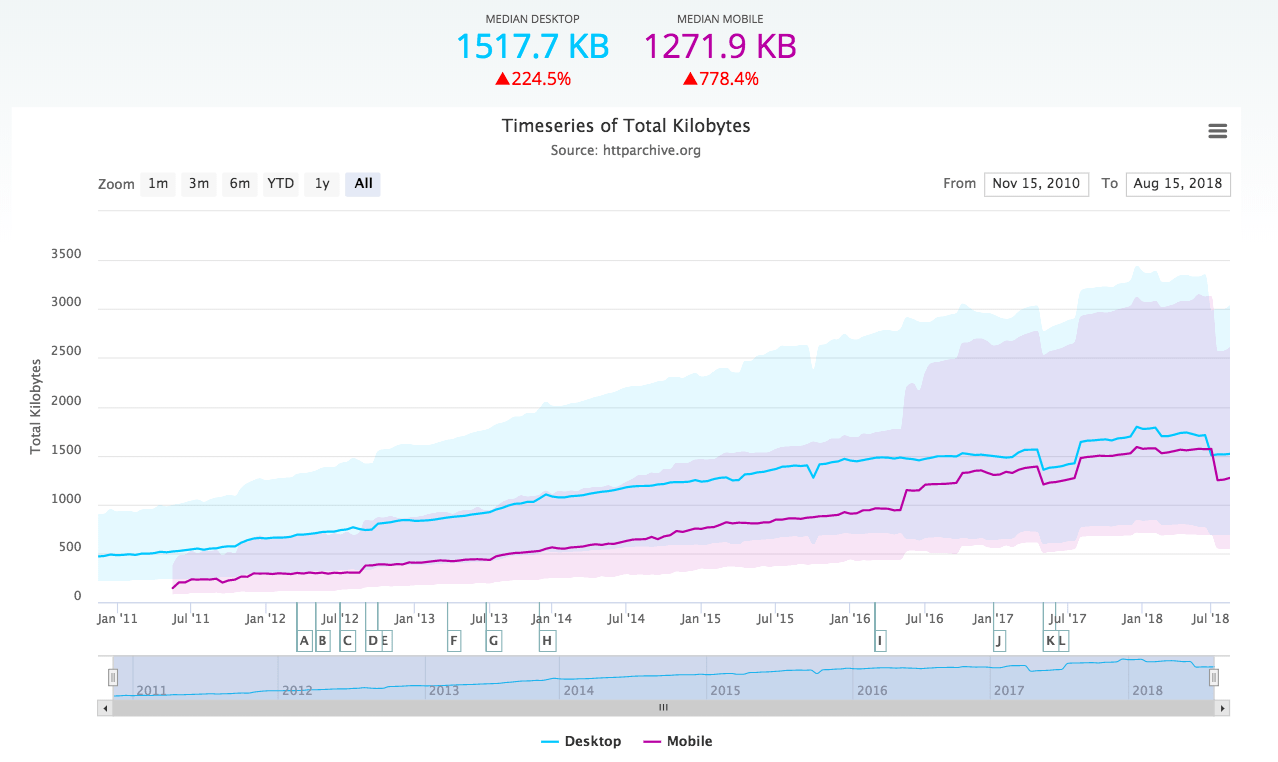When you think about outsourcing (especially offshore outsourcing), usually India comes foremost to mind. The country has been the premier outsourcing destination for years, providing services such as software development and call centers to companies in the West. Though there are other countries gunning for the profitable outsourcing contracts as well, for example the Philippines, India is considered a dominant player.
Now it seems like a new threat to India’s dominance is rising on the African east coast. Kenya is about to get a significant boost to its Internet infrastructure, and since most people there speak English they have a good opportunity to set up for example call center operations. (Most of the population in Kenya is bilingual, the official languages being English and Swahili.)
High interest for outsourcing in Kenya
If you look at the regional interest for outsourcing in 2005, India’s dominance was clear. They were ahead of the game.
Regional interest for outsourcing, 2005, India is #1
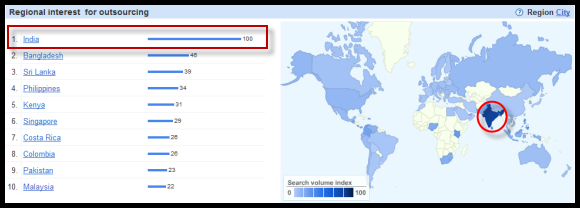
Data from Google Insights for Search, red emphasis added by us.
However, in 2008, the regional interest for outsourcing in Kenya is actually higher than that of India.
Regional interest for outsourcing, 2008, Kenya is #1
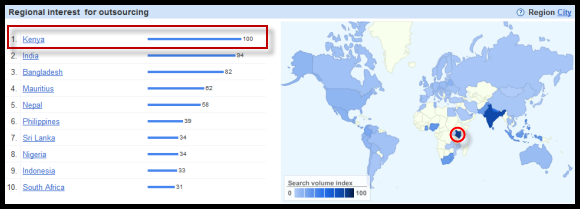
Data from Google Insights for Search, red emphasis added by us.
If nothing else, this shows that the interest to provide outsourcing services is extremely high in Kenya now.
What “regional interest” means: The regional interest as defined by Google is an indication of how likely it is that someone in a specific geographic region searches for a specific term (in this case “outsourcing”).
Infrastructure is key to Kenya’s outsourcing plans
For IT-related outsourcing, good and affordable Internet access is a must, and Kenya’s government has put a high priority on this.
We here at Pingdom have looked at the state of the Internet infrastructure in Africa before, and wrote an article about it back in April. For the time being, the capacity of the Internet in Africa is very limited.
Fortunately, there are developments that will greatly improve this situation both in Kenya and much of East Africa.
Kenya will get serious upgrades to its Internet connectivity via several high-capacity submarine cables that are set for 2009 and 2010 (TEAMS, EASSy and SEACOM), which will also lower the prices for Internet access. Once this happens, we expect that the development of the Internet in Kenya will accelerate rapidly.
What the business world is saying about Kenya’s outsourcing
We’re not the only ones who have noticed Kenya’s interest in becoming a new outsourcing powerhouse. For some added perspective, here are snippets from recent articles from the well-respected CIO Magazine and The Christian Science Monitor.
From an article about Kenya’s economic growth in CIO Magazine:
IDC projects that data centers, managed services, help desks, call centers, and application and hosting services will be key areas to watch in 2009.
The business process outsourcing sector is also expected to reap benefits, given that the government is fully supporting efforts to lower the cost of bandwidth.
From an article about outsourcing in Kenya in The Christian Science Monitor:
“People say to me, ‘Wow, this is happening in Kenya? We only think of you for athletics and wildlife,’ ” says Gilda Odera, managing director of Skyweb-Evans in the heart of the capital, Nairobi. “But people are getting really interested in us.”
Her call center and a dozen others are seeds of an industry that the government hopes will put the East African country on equal terms with India as an outsourcing destination.
The government is pumping millions of dollars into improving the country’s outdated telecom system in an effort to capitalize on Kenya’s large pool of English-speaking graduates.
Eventually it wants Kenya to be as well-known for its call centers as its lions, tea, and coffee.
A great opportunity for Kenya
If Kenya continues to aggressively improve its Internet infrastructure and market itself as a serious alternative to India, there really is no reason why Kenya wouldn’t be able to get a significant portion of the outsourcing cake in the coming years.
It looks like 2009 and 2010 will be key years for Kenya.
- Kenya will get serious upgrades to its Internet connectivity via high-capacity submarine cables.
- Low salary levels will make them highly competitive in the cost department.
- You could also speculate that since the time zone is only shifted by a couple of hours from central European time, European companies might in many cases favor Kenya over India. It would facilitate meetings and other daytime activities.
Of course, Kenya doesn’t have India’s 1+ billion population, but with an estimated population of 38 million there is still a pretty large pool to recruit from…
